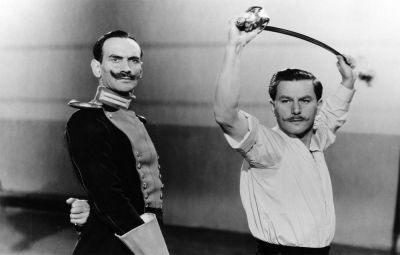
THE LIFE AND DEATH OF COLONEL BLIMP
(Duello a Berlino, Gb/1943) R.: Michael Powell, Emeric Pressburger. D.: 164'. V. inglese Digitale
A seguire (alle 19.30 circa) incontro con Thelma Schoonmaker, premio Oscar per il montaggio e moglie di Michael Powell.
Conduce Ian Christie
Nessun regista mi ha influenzato tanto quanto Michael Powell. Durante la mia infanzia, negli anni Cinquanta e Sessanta, non c'era la possibilità di vedere i suoi film al cinema. L'unico film che potemmo vedere integralmente e a colori fu Scarpette rosse. Gli altri venivano mostrati alla televisione in bianco e nero, tagliati e mutilati. Vidi The Life and Death of Colonel Blimp un pomeriggio dopo la scuola. Mi colpì enormemente. Non avevo mai visto niente di simile. Quel Technicolor così intenso, sgargiante, espressionistico! All'epoca non sapevo niente del contesto politico del film, che narra la commovente amicizia tra un tenente britannico e un ufficiale tedesco nel 1942, durante i bombardamenti tedeschi sull'Inghilterra. Fui completamente soggiogato dalla drammaticità e dalla profonda umanità del film. Per non parlare della grande storia d'amore, con un'unica attrice, Deborah Kerr, a interpretare i tre ruoli femminili. In seguito, quando studiavo cinema a New York, io e i miei amici impazzivamo per i film di Powell. Ma dei loro artefici, il produttore Emeric Pressburger e il regista Michael Powell, non si sapeva assolutamente niente. Non c'erano libri né articoli, niente.
Nel 1974 vidi per la prima volta The Life and Death of Colonel Blimp a colori, ma l'ordine delle scene era cambiato e mancavano circa quaranta minuti. Già allora mi misi alla ricerca di copie del film per ridargli la forma iniziale. Ma fu solo alla metà degli anni Ottanta che potemmo cominciare il restauro, anche se mancavano ancora il negativo e i colori originali. Oggi, dopo trent'anni, ce l'abbiamo fatta. Forse è stato il restauro più lungo della storia del cinema. Il mio ultimo film Hugo Cabret racconta la riscoperta del pioniere del cinema Georges Méliès. Méliès, proprietario di un chiosco di giocattoli alla Gare Montparnasse, grazie a un ragazzino viene riportato alla ribalta e riceve il posto che gli spetta nella storia del cinema. Solo dopo aver terminato Hugo Cabret mi sono accorto che parlava anche di Powell e me. Ed è naturale che tutti i miei personaggi siano influenzati da quelli di Powell. Anche loro sono antieroi, uomini lacerati dai conflitti. L'avidità e il coraggio dei suoi esperimenti cinematografici, le sue sceneggiature che lasciano sempre spazio all'ambiguità, il suo uso vibrante e sofisticato della musica non cessano di colpirmi.
(Martin Scorsese)
No other director has had such an influence on me as Michael Powell. During my childhood in the 50s and 60s, there was no possibility of seeing his films at the movie theater. The only one we could see in its entirety and in colour in the cinema was The Red Shoes. The others were shown on television in black and white, cut up and mutilated. I saw The Life and Death of Colonel Blimp one afternoon after school. The film blew me away. Never before had I seen anything like it. This incredibly intense, flamboyant, expressionistic Technicolor! Watching it, I wasn't initially aware of the political context of the film at all: in 1942, at a time when the Germans were bombing England, he movingly tells the story of the friendship between a British lieutenant and a German officer. I was completely spellbound by the drama, the deep humanity of the film. And the great love story. With a single actress playing all three female characters: Deborah Kerr. Later, when I was studying film in New York, my friends and I were crazy about Powell's films. But about their creators, the producer Emeric Pressburger and the director Michael Powell, there was absolutely nothing known. There were no books, no articles, nothing. In 1974 I saw The Life and Death of Colonel Blimp for the first time in colour but the order of the scenes had been re-edited, and about forty minutes were missing. Back then, I began looking for copies of the film to restore it to its original form. Only in the mid-80s could we start with the recreation, but back then still without the original negative and without the original colors. Now, after thirty years, we've managed to do it. It may be the longest restoration in cinematic history. My new film Hugo Cabret tells of the rediscovery of film pioneer Georges Méliès. Thanks to a little boy, Méliès, who runs a toy store at Montparnasse station, is made brought back into the public eye and receives his proper place in film history. Only when Hugo Cabret was finished did I realize that it figuratively also tells the story of Powell and me. And it's obvious that all my characters are influenced by Powell's heroes. They too are anti-heroes, broken people driven by conflicts. I'm impressed by how much audacity and eagerness to experiment his cinema has: his screenplays that leave room for ambiguities. His sophisticated, forceful use of music!
(Martin Scorsese)

Tariffe:
Aria condizionata
Accesso disabili
Tel. 051 522285











